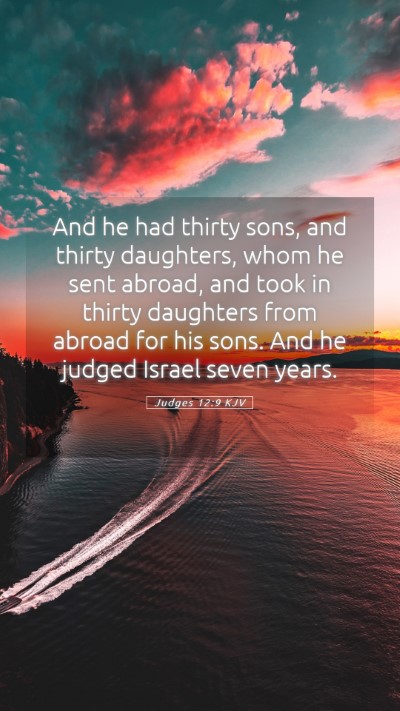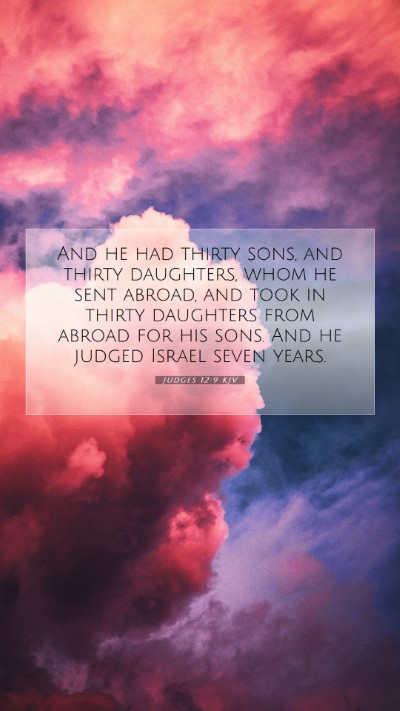Old Testament
Genesis Exodus Leviticus Numbers Deuteronomy Joshua Judges Ruth 1 Samuel 2 Samuel 1 Kings 2 Kings 1 Chronicles 2 Chronicles Ezra Nehemiah Esther Job Psalms Proverbs Ecclesiastes Song of Solomon Isaiah Jeremiah Lamentations Ezekiel Daniel Hosea Joel Amos Obadiah Jonah Micah Nahum Habakkuk Zephaniah Haggai Zechariah MalachiJudges 12:9 Meaning
What is the meaning of Judges 12:9?
And he had thirty sons, and thirty daughters, whom he sent abroad, and took in thirty daughters from abroad for his sons. And he judged Israel seven years.
Judges 12:9 Bible Verse Meaning
Bible Verse Meaning: Judges 12:9
In Judges 12:9, we encounter a specific moment in the narrative of the Judges, illustrating the leadership and responsibilities of the judge Jephthah. This verse is important for understanding the larger themes present in the Book of Judges, including the challenges faced by the Israelites and the nature of God's deliverance through appointed leaders.
Contextual Background
The Book of Judges recounts the time in Israel's history following the conquest of Canaan, a period marked by cycles of apostasy, oppression, and deliverance. Jephthah, chosen by God as a judge, leads the Israelites during a time of oppression from the Ammonites. Judges 12:9 specifically relates to the aftermath of Jephthah's leadership and the ongoing conflicts with neighboring peoples.
Verse Explanation
Judges 12:9 states:
"And he had thirty sons, and thirty daughters, whom he sent abroad, and took in forty daughters from the land of Gilead." (Judges 12:9 KJV)
Analysis of the Text
- Jephthah's Family: This verse illustrates Jephthah's family and lineage, specifically mentioning his thirty sons and daughters. Matthew Henry notes that the mention of his offspring signifies his prosperity and the establishment of his family in Israel.
- Marital Alliances: The phrase "whom he sent abroad" can imply strategic marriages intended to secure alliances with other tribes or regions. Albert Barnes highlights that these marriages could have served a political and social purpose in a fractious environment.
- Significance of Gilead: Adam Clarke emphasizes the geographical and cultural importance of Gilead, where Jephthah's roots lie. His origin in Gilead signifies both his identity and connection to the land from which he rose as a leader.
Full Interpretation
This verse illustrates not only Jephthah's domestic life but also reflects the broader socio-political climate of Israel during the time of the Judges. The children he raised represent the continuation of his legacy, while the marriages arranged symbolize both personal and political strategies in a tumultuous era.
Thematic Insights
- Leadership and Legacy: Jephthah's family serves as a reminder of the responsibilities that come with leadership in Israel. Each of his children represents the potential for future leaders, making family a key element in biblical narratives.
- Divine Providence: The mention of his children and the alliances formed through them highlight the idea that God’s providence often works through family and community structures.
- Conflict and Resolution: Jephthah’s leadership parallels the larger themes of conflict with the Ammonites and the need for unity among tribes in Israel.
Cross References
- Judges 11:1-11: Jephthah's rise to leadership and the vows he made to God.
- Judges 12:1-7: The conflict with the Ephraimites after Jephthah's victory.
- 1 Samuel 8:1-5: The transition from judges to kings, highlighting leadership dynamics.
Conclusion: Understanding the Verse
The verse Judges 12:9 encapsulates key aspects of Jephthah's character, his role in Israel's history, and illustrates broader themes of family and leadership in the scriptural narrative. By studying this verse, we gain insights into the complexities of biblical leadership, the cultural context of familial alliances, and the overarching narrative of God's guidance through human leaders.
For those engaged in Bible study groups or online Bible study, this verse provides rich material for discussion and reflection, especially concerning how to interpret Bible verses in light of historical context and familial influence in leadership. The interpretations drawn from well-established public domain commentaries provide a solid foundation for further Bible study insights and commentaries on other challenging passages as well.
Through this detailed examination, we hope to enhance the understanding of Scripture among readers, equipping them with the tools necessary to delve deeper into the meaning of Bible verses and apply those meanings in their lives.


